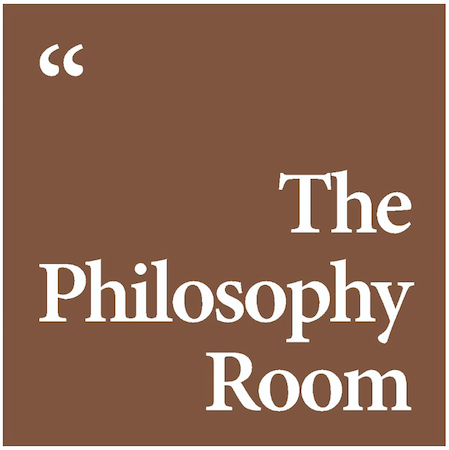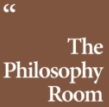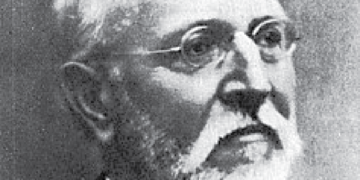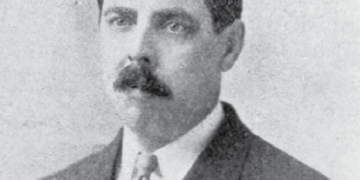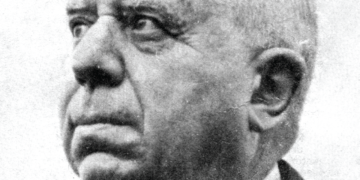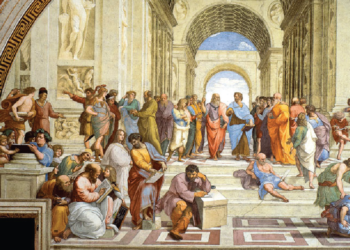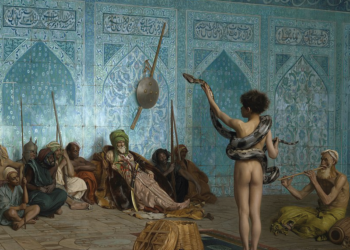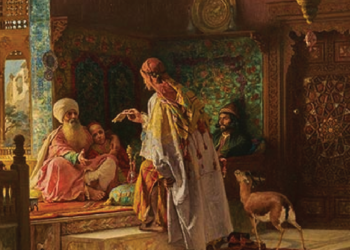F. R. Leavis
1) His Biography
Frederick Robert Leavis, known as F. R. Leavis, was a prominent English critic and literary scholar whose life and work left a lasting impact on the world of literature and criticism. Born on July 14, 1895, in Cambridge, England, Leavis came of age during a time of great intellectual and cultural upheaval. He grew up in a family with a strong academic tradition, and his father was a Baptist minister, while his mother was a schoolteacher.
Leavis’s early education took place in various locations, including Bradford and Cambridge, which exposed him to diverse intellectual influences. He attended Emmanuel College, Cambridge, and later Pembroke College, where he studied English. His academic journey was interrupted by World War I, during which he served in the British Army. After the war, he resumed his studies and eventually received his degree from Cambridge.
In 1924, Leavis began his teaching career as a lecturer at Downing College, Cambridge. He married Queenie Roth, who would become a noted literary critic herself. Throughout his life, Leavis maintained a strong association with Cambridge, where he taught and influenced generations of students. He established the tradition of the Cambridge School of Criticism, which had a profound impact on literary studies in the 20th century.
Leavis’s life and career were marked by a deep commitment to the study and teaching of English literature. His critical approach emphasized close reading of texts, and he was a strong advocate for the idea that literature should be analyzed for its moral and cultural significance. He often found himself in the midst of academic controversies, as he challenged prevailing literary theories and criticized what he saw as the degradation of the English literary canon. Leavis’s work as a critic, teacher, and essayist established him as a significant figure in the field of English literature, and his legacy continues to influence literary scholarship to this day.
2) Main Works
Revaluation: Tradition and Development in English Poetry (1936):
In this seminal work, Leavis discusses the idea of tradition and development in English poetry. He critiques the Romantic poets and argues for the value of the metaphysical poets, particularly T.S. Eliot and Gerard Manley Hopkins. Leavis’s analysis in “Revaluation” challenges prevailing notions about the canon of English literature and provoked significant debate within the academic community.
The Great Tradition (1948):
One of Leavis’s most famous works, “The Great Tradition,” explores the concept of the “great tradition” in English novels. He argues for the primacy of a select group of novelists, including Jane Austen, George Eliot, and Henry James, as exemplars of moral seriousness and artistic excellence. Leavis’s book sparked discussions about what makes a novel truly great and how literature reflects and shapes moral values.
New Bearings in English Poetry (1932):
In this collection of essays, Leavis examines the work of several modern poets, including Eliot, Ezra Pound, and W.B. Yeats. He addresses the challenges and transformations in poetry during the early 20th century, emphasizing the importance of critical engagement with the evolving poetic landscape.
D. H. Lawrence: Novelist (1955):
This work is a critical study of the novelist D. H. Lawrence. Leavis explores Lawrence’s writing in the context of his times, examining the themes, characters, and techniques in Lawrence’s novels. Leavis’s analysis of Lawrence’s works offers a comprehensive understanding of this complex and controversial author.
The Common Pursuit (1952):
“The Common Pursuit” is a collection of essays in which Leavis discusses a wide range of literary and cultural topics. These essays exemplify his critical approach and offer insights into his thoughts on individual writers, the nature of literary criticism, and the relationship between literature and society.
Two Cultures? The Significance of C.P. Snow (1962):
Leavis’s response to C.P. Snow’s famous “Two Cultures” lecture is a crucial text that engages with the divide between the sciences and the humanities. Leavis was a staunch advocate for the humanities and argued for their central role in education and intellectual life.
3) Main Themes
Moral and Cultural Significance of Literature:
One of Leavis’s central themes is the moral and cultural significance of literature. He argued that great literature plays a pivotal role in shaping and reflecting the moral values of a society. He believed that literature should be closely analyzed for its ethical and cultural implications.
Leavis’s views on the moral function of literature can be compared to Matthew Arnold’s concept of “the best that has been thought and said.” Both thinkers emphasize the uplifting and civilizing influence of literature on individuals and society.
Leavis’s approach stands in contrast to formalist literary criticism, which often focused solely on the formal aspects of a text. He argued that literary criticism should address the ethical, cultural, and moral dimensions of literature.
The Great Tradition and Canon Formation:
Leavis championed a particular set of authors, including Jane Austen, George Eliot, and Henry James, as exemplars of the “great tradition” in the English novel. He argued that these novelists displayed a high level of moral seriousness and artistic excellence.
Leavis’s ideas about the “great tradition” bear similarities to Harold Bloom’s concept of the “anxiety of influence,” in which certain authors exert a strong influence on subsequent generations.
Leavis’s canon formation is challenged by other critics who argue for a more inclusive canon that incorporates a broader range of voices, including marginalized and postcolonial writers.
The Role of the Critic and the University:
Leavis emphasized the role of the critic as a moral guide and the importance of the university in upholding cultural and moral values. He believed that critics and academics should take their responsibility seriously in preserving cultural standards.
His stance can be contrasted with Roland Barthes’s ideas on the “death of the author” and the decentralization of the critic’s role. Barthes argued for a more reader-centered approach to literary interpretation.
Leavis’s views on the role of the university and the critic influenced the development of the Cambridge School of Criticism. These ideas also sparked debates about the relationship between literature, academia, and society.
Tradition and Modernity in Literature:
Leavis examined the tension between tradition and modernity in literature. He appreciated the work of certain modernist poets, such as T.S. Eliot, who, in his view, successfully engaged with tradition while addressing contemporary concerns.
Leavis’s views align with those of T.S. Eliot, who believed that modern poetry should have a historical sense and be in dialogue with the literary tradition. Both thinkers stressed the continuity of tradition in modern literature.
Leavis’s approach is critical of pastiche and superficial engagement with tradition in modern literature. He argued that true engagement with tradition should be profound and sincere, rather than merely imitative.
The Role of Language and Close Reading:
Leavis advocated for the rigorous examination of language and close reading as essential tools for literary criticism. He believed that the meaning and moral implications of a text could be fully understood through meticulous analysis of its language, structure, and style.
Leavis’s emphasis on close reading aligns with the principles of New Criticism, a movement in literary criticism that emerged in the 20th century. Both New Critics and Leavisian critics stress the importance of interpreting a text based solely on the text itself, rather than extratextual factors.
While Leavis and New Critics shared an interest in close reading, their interpretations often diverged. New Critics often focused on ambiguity and paradox in texts, whereas Leavis tended to seek clear moral and cultural values in literature. This divergence showcases the diversity of close reading approaches.
4) Leavis as Critic
F. R. Leavis, renowned as one of the most influential literary critics of the 20th century, made a profound impact on the field of literary studies through his distinct approach to criticism. As a critic, Leavis was known for his rigorous, close reading of texts and his commitment to the moral and cultural significance of literature.
Leavis’s critical methodology was characterized by his meticulous examination of the language, style, and structure of literary works. He believed that a deep understanding of a text’s formal elements was essential to uncovering its meaning and moral implications. His approach emphasised the need to engage with the text on its own terms, without imposing extraneous interpretations. This method, often referred to as “practical criticism,” influenced subsequent generations of literary critics who adopted a similar close reading approach.
Another hallmark of Leavis’s criticism was his belief in the moral and cultural role of literature. He argued that literature served as a repository of moral values and cultural traditions, and he often sought to identify these values in the works he analysed. Leavis was critical of literature that he perceived as lacking moral seriousness or cultural significance. He championed authors whose works he believed embodied these qualities and upheld a canon of great literature that reflected his moral and cultural ideals.
Leavis’s critical perspective also extended to his views on the role of the critic in society. He saw the critic as a moral guide and guardian of cultural standards. He believed that critics and academics had a responsibility to uphold the cultural values that he held dear. This view of the critic as a moral authority led to debates about the role of criticism and the ethical responsibilities of critics, sparking discussions about the connection between literature and society.
Furthermore, Leavis’s work was not limited to mere analysis of texts; it also included engagement with contemporary cultural and intellectual debates. He offered critical commentary on various cultural issues, including the impact of mass media, the challenges of modernity, and the role of the university in preserving cultural values. His writings on these topics demonstrated his engagement with the broader cultural context in which literature existed.
5) His Legacy
F. R. Leavis’s legacy in the world of literary criticism is a complex and enduring one, characterized by his influence on critical thought, his contributions to pedagogy, and his impact on the broader cultural conversation.
Leavis’s most notable legacy is his approach to literary criticism, which emphasized the importance of close reading and the meticulous analysis of language, style, and structure. This approach, often referred to as “practical criticism,” has had a lasting impact on the field. Critics who have followed in his footsteps, including those within the Leavisian tradition, have adopted and adapted his methods. Leavis’s emphasis on engaging deeply with texts on their own terms continues to shape the way literary works are analysed, offering a valuable framework for scholars and students alike.
Another significant aspect of Leavis’s legacy is his concept of the “great tradition” in English literature. By championing certain authors as exemplars of moral seriousness and artistic excellence, he influenced the formation of literary canons and the evaluation of literary works. While his canonical choices have been the subject of debate and revision, his advocacy for the study of specific writers and the moral and cultural values they represent has left a lasting impact on the way literature is taught and discussed.
In the realm of pedagogy, Leavis’s influence is evident in the development of the Cambridge School of Criticism. This intellectual tradition, founded on Leavis’s principles, has played a significant role in shaping the study of literature and literary criticism in the academic world. It has also contributed to a tradition of close reading and the critical analysis of texts that extends beyond the boundaries of Cambridge.
Leavis’s legacy is not limited to the academic sphere. His ideas about the moral and cultural significance of literature, as well as his critique of mass culture and the impact of modernity, have had a broader cultural impact. They have contributed to ongoing discussions about the role of literature in society and the challenges posed by rapidly changing cultural landscapes.
However, it’s essential to note that F. R. Leavis’s legacy is a subject of debate and controversy. Critics and scholars have challenged his canonical choices, his emphasis on moral seriousness, and his sometimes prescriptive approach to criticism. While some continue to champion his ideas, others have sought to reevaluate and expand upon his contributions.
